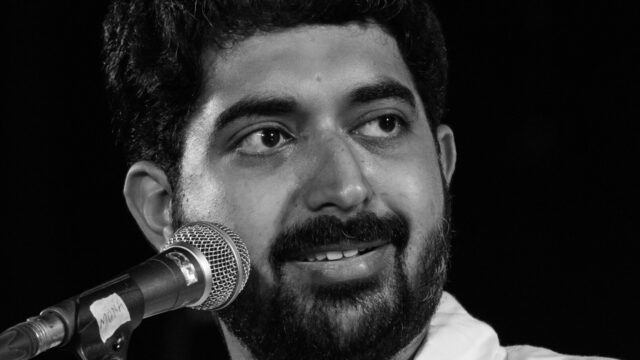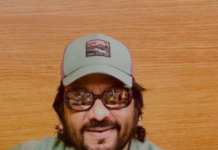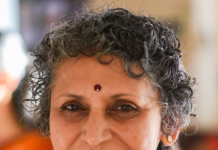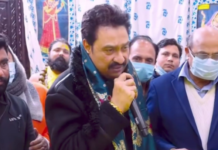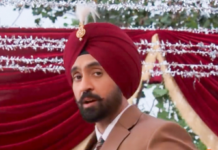CAMBRIDGE, MA–MIT Sangam and LearnQuest Academy of Music are presenting “A Harmonious Dialogue: The Intersection of AI and Indian Classical Music” on Saturday, June 15, at 4 PM at the MIT Wong Auditorium in Cambridge, MA.
The program will deature Kaustuv Kanti Ganguli, a classical Indian musician trained under Pandit Ajoy Chakrabarty. In addition, he has a PhD in Electrical Engineering with a focus on signal processing and machine learning with experience in artificial intelligence.
Ganguli is an Associate Professor in the Computational Systems concentration at Zayed University. He offers a unique perspective on the Indian Ragas through AI and machine learning. As an accomplished performing vocalist of north Indian classical music repertoire, he envisions to merge his knowledge on technology and musical fronts.
MIT Sangam and LearnQuest Academy of Music invite you to join us on Saturday, June 15, at 4 PM at the MIT Wong Auditorium to hear Prof. Kaustuv Kanti Ganguli bridge the worlds of Indian classical music and cutting-edge AI technology. He will demonstrate the connection between AI and raga music through his sonorous singing and his deep insights on the profound art of music appreciation and wisdom.
Here is a conversation between between Pradeep Shukla, president of LearnQuest and Prof. Ganguli:
Shukla: Welcome, Kaustuv. It’s an honor to have you here at MIT for what promises to be an enlightening lecture and recital. To start, could you share with us your journey into the world of Indian classical music and how you came to integrate AI into your work?
Ganguli: Thank you, Dr. Shukla. My journey in Indian classical music began at a very young age. Growing up in a musically inclined family, I was exposed to the rich traditions of our classical music early on. Over the years, I honed my skills under the guidance of several esteemed gurus, most notably under Pandit Ajoy Chakrabarty. My foray into AI stemmed from a deep-seated curiosity about the intersection of technology and art. As I pursued my research in computational musicology, I began to see the immense potential of AI in understanding and augmenting musical expression.
Shukla: That’s fascinating. I heard that your recent lec-dem in Bengaluru was quite a success. Can you tell us about the key themes you explored there and how they will resonate with our audience here at MIT?
Ganguli: The lec-dem in Bengaluru focused on ‘Music Appreciation and Technology.’ The core idea was to showcase how AI can both analyze and enhance musical experiences. We delved into how AI can achieve technical precision in music, analyze vast musical archives, and even aid in the training of musicians. The audience was particularly intrigued by the potential of AI to assist in music archiving and music information retrieval. Here at MIT, I plan to extend these themes and delve deeper into the practical applications of AI in music education and performance.
Shukla: The concept of AI ‘singing’ in perfect tune and rhythm is both exciting and intimidating for many classical musicians. How do you address the concerns about AI potentially overshadowing human artistry?
Ganguli: That’s a very pertinent question. It’s essential to understand that AI is not here to replace human musicians but to complement and enhance their capabilities. While AI can achieve remarkable technical feats, the emotional and aesthetic nuances of music are inherently human. The goal is to use AI as a tool that aids musicians in their practice, helps in archiving and analyzing music, and provides new ways to engage with and appreciate music. It’s about finding a harmonious balance where technology serves to elevate the art form.
Shukla: You mentioned the potential of AI in music education. Can you elaborate on how AI can transform the way we teach and learn Indian classical music?
Ganguli: Absolutely. AI can revolutionize music education by providing personalized training aids and feedback to students. For instance, AI can help students by offering real-time feedback on their performance, highlighting areas that need improvement, and suggesting practice routines tailored to their progress. Moreover, AI can facilitate access to a vast repository of musical knowledge, enabling students to explore different styles and techniques through interactive learning modules. This can make the learning process more engaging and efficient.
Shukla: It sounds like AI has a lot to offer. However, there’s also a fear that it might dilute the traditional aspects of music. How do you see the balance between preserving tradition and embracing innovation?
Ganguli: Tradition and innovation are not mutually exclusive; they can coexist and enrich each other. AI provides new tools and methods that can help preserve and promote traditional music. For example, AI can assist in the digitization and archiving of rare recordings, ensuring they are preserved for future generations. At the same time, AI can introduce innovative ways to experience and interact with music, making it more accessible and appealing to younger audiences. The key is to approach AI as an enabler rather than a disruptor.
Shukla: That’s an insightful perspective. Before we conclude, could you give us a sneak peek into what the audience can expect from your performance this Saturday?
Ganguli: I am excited to present a unique blend of traditional Indian classical music and innovative technological applications. The performance will feature a traditional recital complemented by demonstrations of AI’s capabilities in music analysis and augmentation. The audience will witness how AI can enhance the listening experience while preserving the essence of the art form. It promises to be a memorable evening of music and technology in harmony.
Shukla: Thank you, Kaustuv, for sharing your thoughts and insights. We look forward to an extraordinary event that will undoubtedly inspire and enlighten our audience.
Ganguli: Thank you, Dr. Shukla. I am looking forward to it as well.
MIT Sangam and LearnQuest Academy of Music invite you to join us on Saturday, June 15, at 4 PM at the MIT Wong Auditorium (MIT E51-115, 70 Memorial Drive, Cambridge, MA 02142) to hear Prof. Kaustuv Kanti Ganguli bridge the worlds of Indian classical music and cutting-edge AI technology. He will demonstrate the connection between AI and raga music through his sonorous singing and his deep insights on the profound art of music appreciation and wisdom.
Don’t miss this unique opportunity to experience the future of music.
For more info please contact:
Pradeep Shukla | Events@learnquest.org | (781) 891-8535
Hridibrata Pal | hpal@mit.edu



